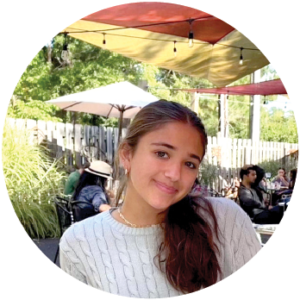Our Writer Finds Out How She & Her Peers Can Stay Strong

I never thought that of all the worries that come along with being a teenager, being able to see friends, eating inside at restaurants, and going to school would make it to the top of my list. But when the pandemic hit, these things I took for granted were abruptly taken away. Each phase of the pandemic brought a new worry. I don’t know which was worse: the beginning when everyone was in strict isolation, or the period when things slowly started to re-open and everyone held different definitions of what the “right” or “safe” thing to do was.
Either way, we were faced with issues that were definitely not the normal stresses that come along with being a teenager. Amidst the lack of social interactions and the scares that came when waking up with a sore throat, many faced new or aggravated mental health struggles. On top of normal worries about Covid, we had to miss out on monumental moments of our social so many lives, education, and just simply growing up.
Once reality settled in during the initial lockdown, any feelings of excitement about a two week break from school quickly died down. “The beginning of online school was kind of exciting, but as it went on it was like… how much longer is this gonna go on for? Where are my friends? Where are any other people besides my family?” said one Horace Greeley high school student.
Loneliness began to creep up on people. “Being inside and alone for so long definitely did not help my mental health,” said another Greeley student. These feelings of loneliness and anxiety were, and still are, completely normal. Humans have never been creatures that deal particularly well with change, and with a change as big as a global pandemic, we need to cut ourselves some slack.
During this first wave many were unsure of how to cope and what to do with their time. “I’m not gonna lie, I didn’t do much during the lockdown. I didn’t really find anything that helped me,” said a Greeley student. Another said “I sat in my room all day which definitely did not help my mental health.” Teens being in isolation during some of the most vital years of their development was difficult to say the least.
In a CNN segment, Michael Smerconish said that he’s “worried about kids being educated remotely and losing out on a whole host of social dynamics. What you can’t get in the remote world are the life lessons, the human interactions, the forging of relationships.”
However, things started to look up as people were getting vaccinated, returning to school in person, and finally spending time together. Even though I am a sophomore, returning to school this year full time in person felt like my first real year of high school. The level of focus and material I’m learning has improved drastically. I even had a teacher thank a kid for talking and laughing over them because they missed that realness after a year of silence and stiffness on Zoom.
Another Greeley student said that “it is good to get to see people and actually learn.” For most, it seemed the only thing that kept them sane was getting back to in-person schooling and seeing their friends. Smerconish shared that he felt it was unfair that kids are “bearing the brunt of Covid even though most infected children are at much less risk of becoming severely ill,” and therefore, “anytime society is contemplating a response to Covid, their needs need to be prioritized.” While maintaining safety throughout Covid is extremely important, it is also important to prioritize kids’ mental health.
Horace Greeley psychologist Dr. McAuliffe shared insightful advice to help students remain hopeful. “In general, choosing to have an optimistic attitude, to believe things will work out helps. Believing in your ability to handle hard situations also contributes to an attitude where students can engage in managing their challenges rather than overly worrying about things. The truth is, we all will get through this and overly worrying robs people of the ability to solve problems.”
While many aspects of teens’ mental health have been hurt due to the pandemic, I also think that after going through this experience, teens came out more resilient than ever. Aside from learning about masks, social distancing, and quarantining, we also learned to adjust, grow, and deal with change.
“I continue to be amazed how well kids cope with this in general, despite the fact that this is a really hard situation,” said Dr. McAuliffe. I’m optimistic that we can use the strength we have gained, remain hopeful, and, as said by Dr. McAuliffe, “persist, persist, persist.”
